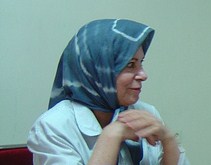Related Research Articles

Esperantujo or Esperantio is the community of speakers of the Esperanto language and their culture, as well as the places and institutions where the language is used. The term is used "as if it were a country."

L. L. Zamenhof developed Esperanto in the 1870s and '80s. Unua Libro, the first print discussion of the language, appeared in 1887. The number of Esperanto speakers have increased gradually since then, without much support from governments and international organizations. Its use has, in some instances, been outlawed or otherwise suppressed.
The Esperanto Association of Britain (EAB) is a registered educational charity whose objective is to advance education in and about the international language Esperanto and to preserve and promote the culture and heritage of Esperanto for the educational benefit of the general public. The organisation was established in 1904.
Norvega Esperantista Ligo was founded in 1911. As the Norwegian arm of the Esperanto movement, its aim is to spread knowledge and use of the international language Esperanto. The league has a modest size of a couple of hundred members, and work done within NEL is mostly voluntary. The youth wing of NEL is Norvega Junularo Esperantista.
Esperanto II or Esperanto 2 was a reform of Esperanto proposed by René de Saussure in 1937, the last of a long series of such proposals beginning with a 1907 response to Ido with a project called Lingwo Internaciona, later called Antido 1. Esperanto II was one of several languages investigated by the International Auxiliary Language Association, the linguistic research body that eventually standardized and presented Interlingua de IALA.

Esperanto-USA (E-USA) is the largest organization for speakers and supporters of Esperanto in the United States. It was founded in 1952 as the Esperanto League for North America (ELNA) in Sacramento, California. Headquartered in Portland, Maine, Esperanto-USA is a 501(c)(3) nonprofit organization and the U.S. affiliate of the Universal Esperanto Association. Brandon Sowers is President of E-USA, and Quintyn Bobb is Vice-President.
The Canadian Esperanto Association is a registered educational charity whose objective is to advance the education of Esperanto among the Canadian public.

Hector Hodler was a Swiss Esperantist who had a strong influence on the early Esperanto movement.
Vladimír von Szmurlo was a Russian Esperantist and railway engineer.

Raymond Schwartz was a French banker and Esperanto author who wrote many poems and novels in Esperanto, as well as skits which he directed for Parisian Esperanto cabarets.
Hans Jakob Notz was a German-born Swiss Esperantist. His real name was Franz.

The World Esperantist Vegetarian Association is a voluntary association of Esperanto-speaking vegetarians. Founded in 1908, the group's working language is Esperanto, and it is the oldest international organization of vegetarians that is currently active. TEVA published a journal, Vegetarano ("Vegetarian") from 1914 to 1932, revived in 2009 as Esperantista Vegetarano, and has also operated a spirited Internet mailing list through Yahoo! Groups since 2005.
Medicina Internacia Revuo is the official organ of Universala Medicina Esperanto Asocio, an organization that gathers physicians, pharmacists, and other medical professionals who have a working knowledge of Esperanto. The twice-yearly journal publishes articles that have undergone peer review and that are written in various languages, including English and Polish; abstracts are provided in English and Esperanto. The journal publishes broadly within the medical sciences, has an internationally renowned board of editors, and is included in the Index Copernicus database. The journal is available gold open access, but no author fees are charged.

The Iranian Esperanto Association, founded in 1996, is the national association of the World Esperanto Association in Iran.

Usona Esperantisto is the bi-monthly publication of Esperanto-USA, the organization for Esperanto speakers in the United States. Most of the content is in Esperanto, with the remainder in English. Topics include discussions of Esperanto culture, book reviews, short stories, and games.

The Esperanto workers movement has the goal of taking practical advantage of the international language Esperanto for advancing the goals of the labour movement, especially the fight against unrestrained capitalism. It is not only a political movement in the strict sense but also a cultural and educational one. Currently the principal Esperanto associations active in the Esperanto workers movement at the global level are the Sennacieca Asocio Tutmonda and the Internacia Komunista Esperantista Kolektivo, and in a wider sense, the Monda Asembleo Socia.

The following outline is provided as an overview of and topical guide to Esperanto:
Esperantisto may refer to a number of Esperanto publications including:
References
- 1 2 R. Kent Rasmussen (April 21, 2013). Dear Mark Twain: Letters from His Readers. University of California Press. p. 250. ISBN 978-0-520-95516-5 . Retrieved November 17, 2015.
- ↑ [http://eventoj.freeweb.hu/steb/gxenerala_naturscienco/enciklopedio-1/encikl.htm Archived February 18, 2009, at the Wayback Machine article in 1933-34 Enciklopedio de Esperanto
- ↑ L'Amerika Esperantisto, August 1908, Volumes 4-7, Esperanto Association of North America.
- ↑ "American Esperanto Magazine 1967:1". Esperanto USA. Retrieved 20 May 2024.